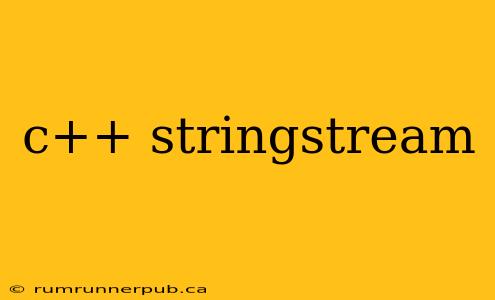C++ stringstreams offer a powerful and flexible way to manipulate strings and numerical data. They provide a bridge between string representations and the standard input/output streams, allowing for easy conversion and formatting. This article explores the capabilities of stringstream using insights gleaned from Stack Overflow, augmented with practical examples and explanations to solidify your understanding.
What is a Stringstream?
A stringstream is an object that operates like a stream, but instead of reading from or writing to a file or the console, it reads from or writes to a string. This makes it incredibly useful for tasks like parsing strings, converting data types, and building formatted strings dynamically. The primary classes are stringstream, istringstream (input string stream), and ostringstream (output string stream).
Common Use Cases & Stack Overflow Solutions
Let's explore some common stringstream uses, drawing upon wisdom from the Stack Overflow community:
1. Converting Strings to Numbers:
A frequent task involves converting strings containing numerical data into their numeric equivalents (e.g., "123" to the integer 123). Many Stack Overflow questions address this, often highlighting potential errors.
Example (Inspired by several Stack Overflow solutions):
#include <iostream>
#include <sstream>
#include <string>
int stringToInt(const std::string& str) {
int num;
std::stringstream ss(str);
if (!(ss >> num)) { //Check for successful extraction
throw std::runtime_error("Invalid input string"); //Handle errors gracefully as suggested in many SO answers.
}
return num;
}
int main() {
std::string str1 = "123";
std::string str2 = "abc"; //Example of invalid input
try{
std::cout << "Integer from \"" << str1 << "\": " << stringToInt(str1) << std::endl;
std::cout << "Integer from \"" << str2 << "\": " << stringToInt(str2) << std::endl;
} catch (const std::runtime_error& error){
std::cerr << "Error: " << error.what() << std::endl;
}
return 0;
}
Analysis: This example demonstrates robust error handling – a crucial aspect often highlighted in Stack Overflow discussions on string conversion. The if condition checks for successful extraction, preventing unexpected behavior with invalid input. The try-catch block provides a clean way to manage potential exceptions.
2. Building Formatted Strings:
stringstream excels at creating formatted strings dynamically. This is particularly useful when dealing with variable data that needs to be incorporated into a larger string.
Example:
#include <iostream>
#include <sstream>
#include <string>
std::string buildFormattedString(int id, const std::string& name, double value) {
std::stringstream ss;
ss << "ID: " << id << ", Name: " << name << ", Value: " << value;
return ss.str();
}
int main() {
std::string formattedString = buildFormattedString(101, "Example Item", 3.14159);
std::cout << formattedString << std::endl;
return 0;
}
This example showcases how easily you can concatenate different data types into a single string using the << operator, a common technique seen across numerous Stack Overflow answers regarding string formatting in C++.
3. Parsing CSV Data:
Many Stack Overflow posts address parsing comma-separated value (CSV) data. stringstream simplifies this process by allowing you to extract fields one by one.
Example (Simplified CSV parsing):
#include <iostream>
#include <sstream>
#include <string>
#include <vector>
std::vector<std::string> parseCSVLine(const std::string& line) {
std::vector<std::string> fields;
std::stringstream ss(line);
std::string field;
while (std::getline(ss, field, ',')) {
fields.push_back(field);
}
return fields;
}
int main() {
std::string line = "apple,banana,cherry";
std::vector<std::string> parsedFields = parseCSVLine(line);
for (const auto& field : parsedFields) {
std::cout << field << std::endl;
}
return 0;
}
This example utilizes std::getline to extract fields separated by commas, a common approach found in Stack Overflow discussions about CSV parsing. Note that this is a simplified example; real-world CSV parsing often requires handling quoted fields and escaping.
Beyond the Basics: Advanced Techniques
While the examples above cover common uses, stringstream offers more advanced capabilities:
- Manipulators: You can use
std::setw,std::setprecision, and other manipulators to fine-tune the output formatting, enhancing control over the resulting string's appearance. - String Conversion with Specific Formats: You can utilize the
std::hex,std::oct, and similar manipulators to convert numbers to specific bases (hexadecimal, octal, etc.). - Integration with other libraries:
stringstreamcan be seamlessly integrated with other libraries to enhance data processing capabilities.
Conclusion
C++ stringstream provides a versatile tool for string manipulation and data conversion. This article, informed by the wealth of knowledge on Stack Overflow, provides a solid foundation for understanding and effectively utilizing its capabilities. By incorporating error handling and understanding the nuances of formatting, you can leverage stringstream to create robust and efficient C++ applications. Remember to consult Stack Overflow for more specialized solutions and best practices as your needs evolve.
